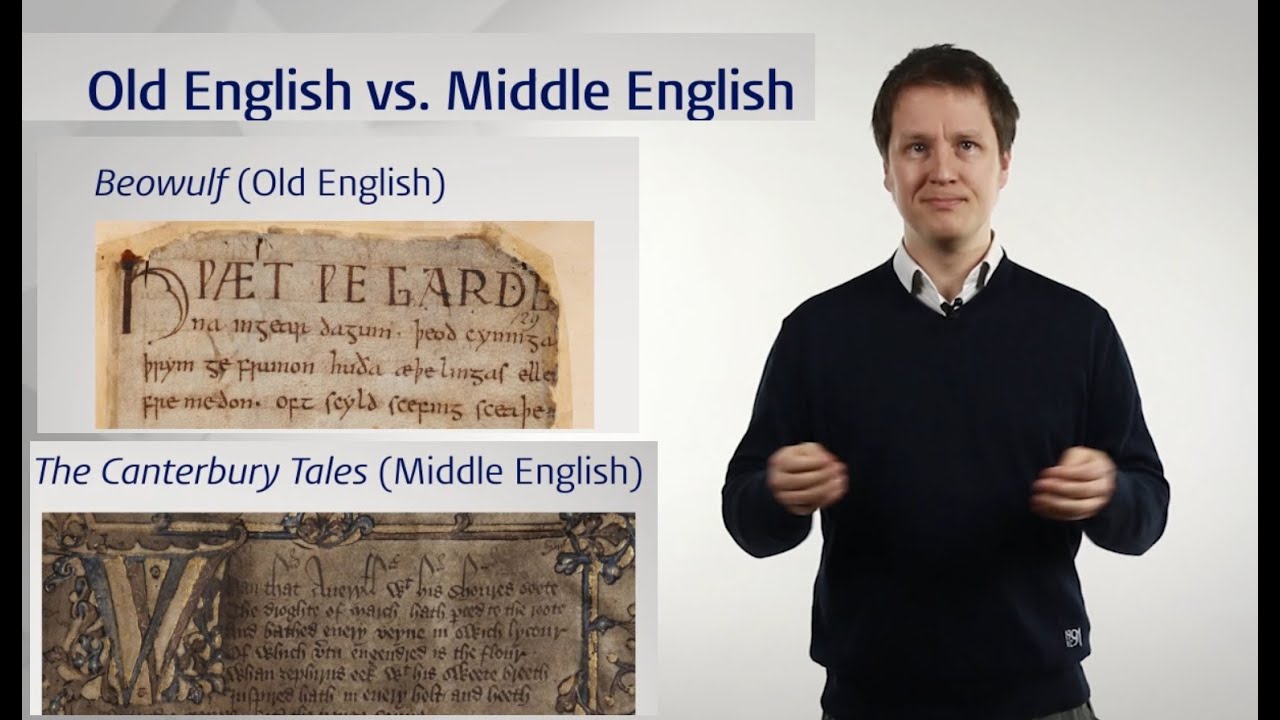The origins of English: A short introduction to Old English
Summary
TLDRThis video delves into the origins of English, highlighting Old English's distinct features compared to modern English, such as different symbols, vocabulary, and sentence structure. It traces the language's roots back to Germanic tribes like the Angles, Saxons, and Jutes who migrated to Britain around 450 AD. Despite Old English's last native speaker dying over 900 years ago, its influence is still evident in today's language and popular culture, with words like 'home' and 'stone' having Old English origins. The video also notes how Old English inspires modern fantasy literature and is featured in TV series like 'Merlin' and 'Vikings'.
Takeaways
- 🏛️ Old English, also known as Anglo-Saxon, is the earliest form of the English language spoken over a thousand years ago.
- 🎭 Contrary to common misconception, Old English is not associated with William Shakespeare, whose works were written much later.
- 🔤 Old English features different symbols, words, pronunciation, and sentence structure compared to Modern English.
- 🌐 The language shares similarities with Frisian, Dutch, German, and Danish due to its Germanic roots.
- 🛳️ Old English originated from Germanic tribes, primarily the Angles, Saxons, and Jutes, who migrated to Britain around the year 450.
- 🏰 The legendary figures Hengist and Horsa are associated with the migration, though their story is likely a myth.
- 📜 Old English produced a significant body of literature, including medical texts, magical spells, and epic poetry like Beowulf.
- 🎞️ Old English continues to influence modern culture, particularly in fantasy literature and film adaptations.
- 🌐 Core vocabulary in present-day English, such as 'home', 'stone', and 'wood', has its roots in Old English.
- 🎭 Modern media, like the Harry Potter series, incorporates Old English words and names, keeping the language alive in popular culture.
Q & A
What is the origin of the English language discussed in the video?
-The video discusses that Old English, the earliest stage of the English language, originated from Germanic people who came from areas now known as the Low Countries, northern Germany, and Southern Denmark.
Why is the association between Old English and William Shakespeare incorrect?
-The association is incorrect because Old English is a thousand years older than Shakespeare, who lived from 1564 to 1616, and his famous quotes would have sounded completely different if they had been written in Old English.
What are some of the unique features of Old English that distinguish it from Modern English?
-Old English has different symbols like the ash and the thorn, different words, different pronunciation, different sentence structure, and grammatical gender and case.
What are the names of the three tribes that brought the English language to Britain?
-The three tribes that brought the English language to Britain were the Angles, Saxons, and Jutes, collectively often referred to as the Anglo-Saxons.
What is the significance of the fortress in Leiden, Netherlands, in the context of Old English?
-According to medieval legends, the fortress in Leiden was a back-up plan for Hengist and Horsa, who led the Anglo-Saxons to Britain. However, much of this story is considered myth, and the fortress is not definitively connected to the Anglo-Saxons.
What is the oldest surviving poem in Old English, and what is it about?
-The oldest surviving poem in Old English is 'Beowulf,' an epic poem that tells the tale of the hero Beowulf fighting monsters and a dragon.
How has Old English influenced modern popular culture?
-Old English has influenced modern popular culture, particularly in fantasy literature, where many modern authors have been inspired by medieval language and literature, including names and dialogues in works like 'Harry Potter' and TV series such as 'Merlin' and 'Vikings'.
What evidence is there of Old English in the language we use today?
-Many common words we use today, such as 'home,' 'stone,' 'it,' 'is,' 'today,' 'word,' 'wood,' 'there,' 'what,' 'will,' 'if,' 'and,' and 'up,' derive from Old English, indicating that much of the core vocabulary of present-day English is over a thousand years old.
How does the video suggest that Old English is still very much alive?
-The video suggests that Old English is still very much alive through its influence on modern vocabulary, popular culture, and the fact that it has inspired authors and creators in their works.
What is the significance of the phrase 'All is well that ends well' in the context of the video?
-The phrase 'All is well that ends well' is a quote from Shakespeare, which the video uses to illustrate how Shakespeare's language would have sounded if he had spoken Old English, highlighting the difference between Old English and the English of his time.
Outlines

Dieser Bereich ist nur für Premium-Benutzer verfügbar. Bitte führen Sie ein Upgrade durch, um auf diesen Abschnitt zuzugreifen.
Upgrade durchführenMindmap

Dieser Bereich ist nur für Premium-Benutzer verfügbar. Bitte führen Sie ein Upgrade durch, um auf diesen Abschnitt zuzugreifen.
Upgrade durchführenKeywords

Dieser Bereich ist nur für Premium-Benutzer verfügbar. Bitte führen Sie ein Upgrade durch, um auf diesen Abschnitt zuzugreifen.
Upgrade durchführenHighlights

Dieser Bereich ist nur für Premium-Benutzer verfügbar. Bitte führen Sie ein Upgrade durch, um auf diesen Abschnitt zuzugreifen.
Upgrade durchführenTranscripts

Dieser Bereich ist nur für Premium-Benutzer verfügbar. Bitte führen Sie ein Upgrade durch, um auf diesen Abschnitt zuzugreifen.
Upgrade durchführen5.0 / 5 (0 votes)






